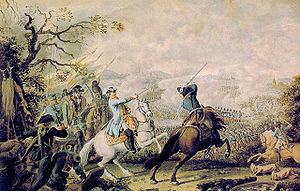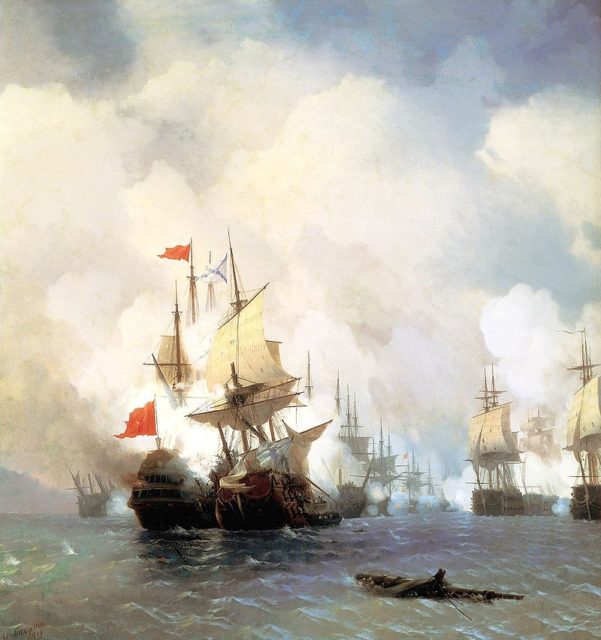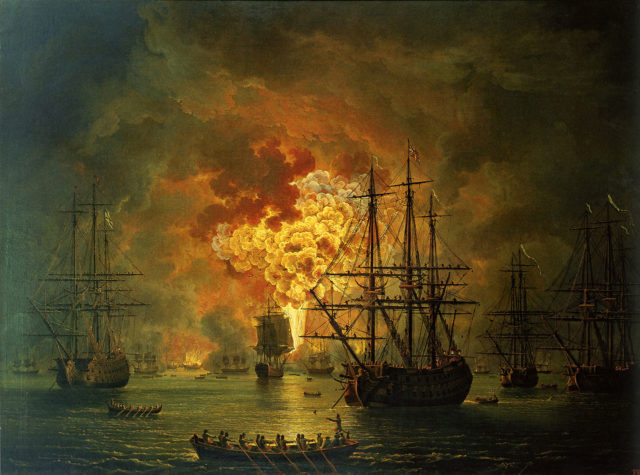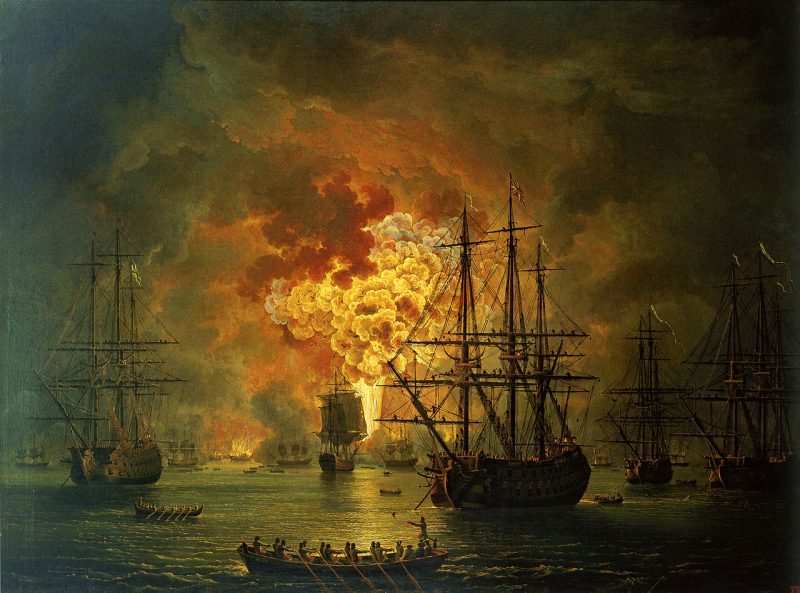In the Summer of 1770, the Mediterranean sea would be the scene of an epic battle. It was 5th of July, and the Russian fleet would fight the Turkish forces at the Island of Chios. After three days of intense battle, a well-deserved victory finally came.
Prelude to The Battle of Chesma

In the 6th Russian-Turkish war, the Baltic fleet of the Russians would go beyond its usual distance from the motherland. The reason was this – to rout the Turkish navy in the Mediterranean. The favorite of the Russian Empress Ekaterina II, Alexey Orlov was the one to come up with the idea.
Alexey and his brother Gregory had a plan, which would land a disastrous strike against the Turks. The victory they planned to achieve would not only take the Turkish forces by surprise but would also light a revolt against the Turkish Sultan and his power over the Christian lands.
The younger brother, Alexey decided that if the Russian fleet entered the Mediterranean, it could attack the Turkish one from behind and rout them. Thus, the first Russian ships entered the Mediterranean in the cold February of 1770. Although the waters were foreign even for their commander, the seasoned Admiral Spiridov, the Russians were eager to record a victory.
By the summer of 1770, near Greece, there were already two Russian squadrons. Several intense battles between the Turks and the Russians took place there, but without a decisive result. However, the Russians were not ready to abandon their mission.
Thus, their main navy met the Turkish fleet near the Greek Island of Chios in the Aegean Sea. On the other side of the island was the Turkish port of Chesma.

The Russian fleet had to counter one more problem on their mission. Their enemy significantly outnumbered them. The Ottoman Admiral Hüsameddin Pasha commanded a much bigger navy than Spiridov. The Turkish had 16 ships of the line, six frigates, six xebecs, 13 galleys, 32 small crafts, 1,300 guns.
This was more than double the Russian force. Spiridov had to defeat the Turkish with only nine ships of the line, three frigates, one bomb ketch, four fireships, and four supply ships at his disposal.
The outgunned and overpowered Russian fleet entered the Chios channel on the 5th of July, 1770. Both the Turks and the Russians spent the early morning hours deploying their naval forces. With their eye on the enemy, the two sides went into formation.
The Russian captains, realizing their smaller chances decided to take a risky approach. On their general meeting, the Russian captains made an important decision. To do the most damage to the Turks, they would anchor their ships at point blank range, and go all out with a cannonade. The Russians were to sail at the side of the Turkish fleet, taking down their ships one by one.
Battle of Chesma

At noon, 11:30, the attack was sounded. The Russian fleet began its risky maneuver, cutting down the distance, closing to no more than 90 meters from the enemy. Only 15 minutes later and 500 meters away, the Turkish fleet opened fire. The Russian ships continued to advance to the Turkish lines, without firing a single gun. The Russian flagship “Sv. Evstafii” finally reached the Turkish Real Mustafa at firearm range.
Spiridov’s ship opened fire at the enemy’s flagship. During the following boarding, the burning mainmast of Real Mustafa fell on the Russian flagship. Both ships exploded. Hundreds of men were lost on both sides, due to the explosion of the flagships. The Russian Admiral Spiridov survived, thrown into the water by the explosion.
The battle was at its climax in the waters near Chios. Russian and Turkish ships fired at each other, filling the salty air with clouds of gunpowder smoke. Every Russian ship had closed on the Turkish fleet, firing from no more than 20-meter range. Some of the Turks saw no other way out from the unstoppable cannonade and jumped into the sea, hoping to swim to the nearest shore.
Panic took over the Turkish sailors when they saw their leader’s flagship explode. Only three hours after, the artillery fire of the Russians caused the Turkish to withdraw from the fight. Disorganized and scattered the Turkish sailed to their port at Chesma, only to be followed by the Russians.
The Blockade

For two long and exhausting days, the Turkish fleet was blockaded at Chesma Bay by the Russian ships. During those dreadful hours, the Russians did not cease fire. Almost the entire Turkish fleet, which retreated from the fight at the channel, was destroyed. One of the biggest Turkish ships, the Rhodes, was captured by the Russians.
Five large Turkish battleships became trophies for the celebrating Russians. The casualties for the Turkish were immense. Above 11,000 men were either killed, drowned or captured during the three days. On this battle, the Russians lost only five ships in total, about 600 men, and 40 wounded.
Conclusions
The Battle of Chesma, on 5th of July, 1770, became known as one of the greatest naval victories in Russian history. Fought on the same day as the Battle of Larga, it was a heavy blow for the Ottoman Empire. The Ottomans had not suffered such a devastating defeat since the infamous Battle of Lepanto. The victory at Chesma is also considered to have been an inspiration for the Greek War of Independence.
Just as expected, the Russian victory caused significant changes for the Ottomans. The Russians gained control over the Aegean sea for some time, but most importantly their plan did work. After the Ottomans were defeated the Christian countries on the Peninsula saw a chance for their revolt. The rebellions shattered the otherwise unshakeable Ottoman Empire. Soon after, the Ottoman Empire began a period of decline.
Although the Battle of Chesma was not the only event to cause the downfall of the Ottomans’ power in the Balkans, it still was a significant blow to their integrity and influence. It was also a strong motivator for the Russians to continue their quest against the all-mighty Empire.
Bibliography:
- Anderson, Roger Charles (1952) Naval wars in the Levant 1559—1853, Martino Publishing
- The history of Russian Navy, article Chesma and Patras
- A. Volnetz, article The Chesma Triumph of the Russian Fleet
